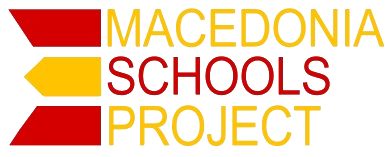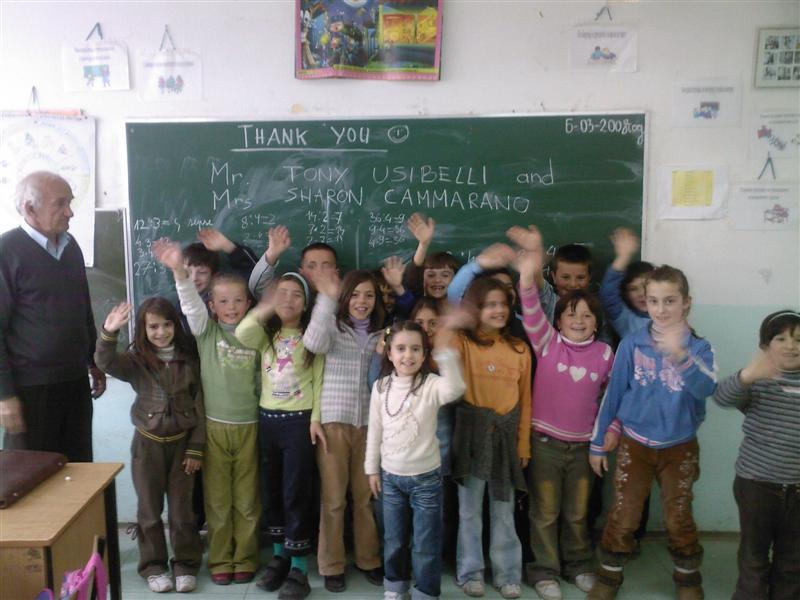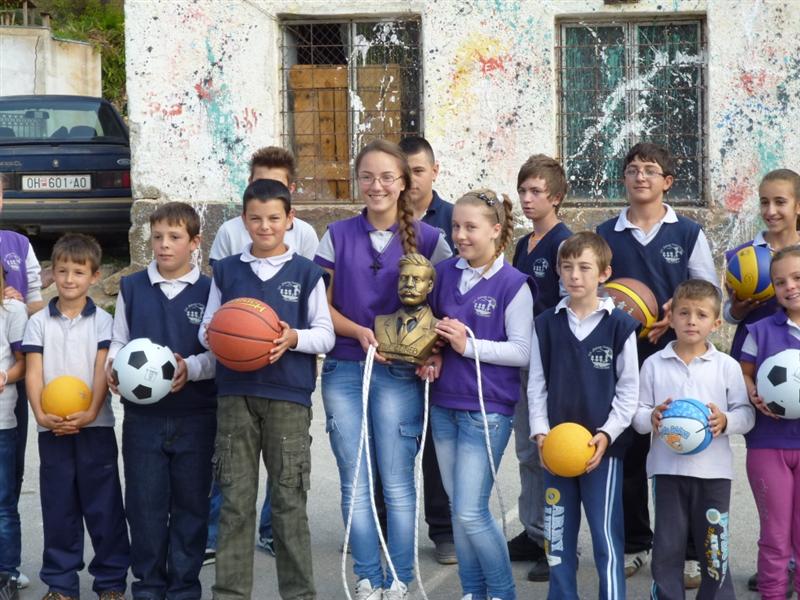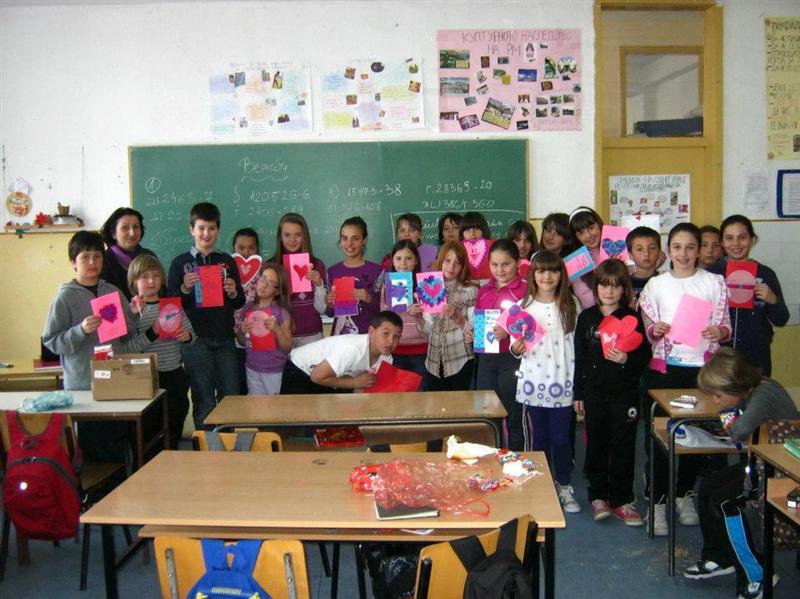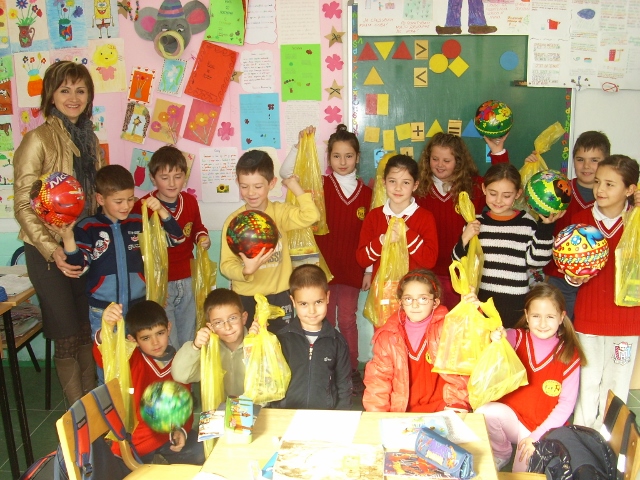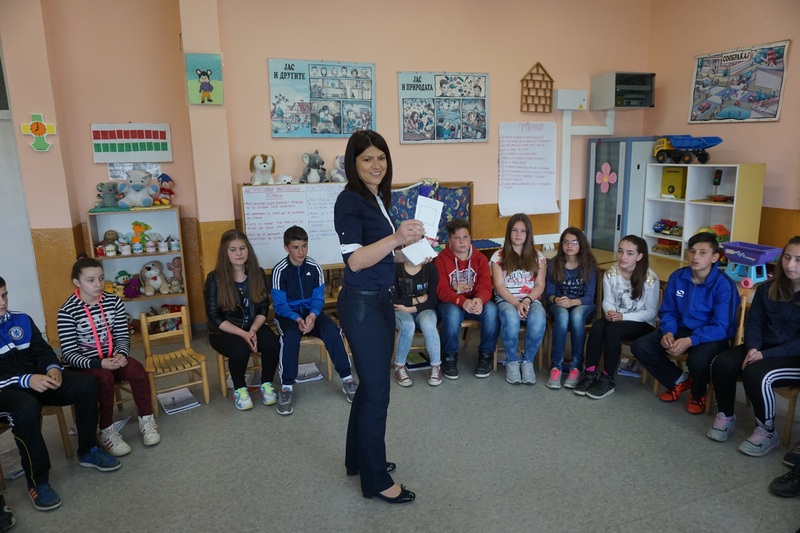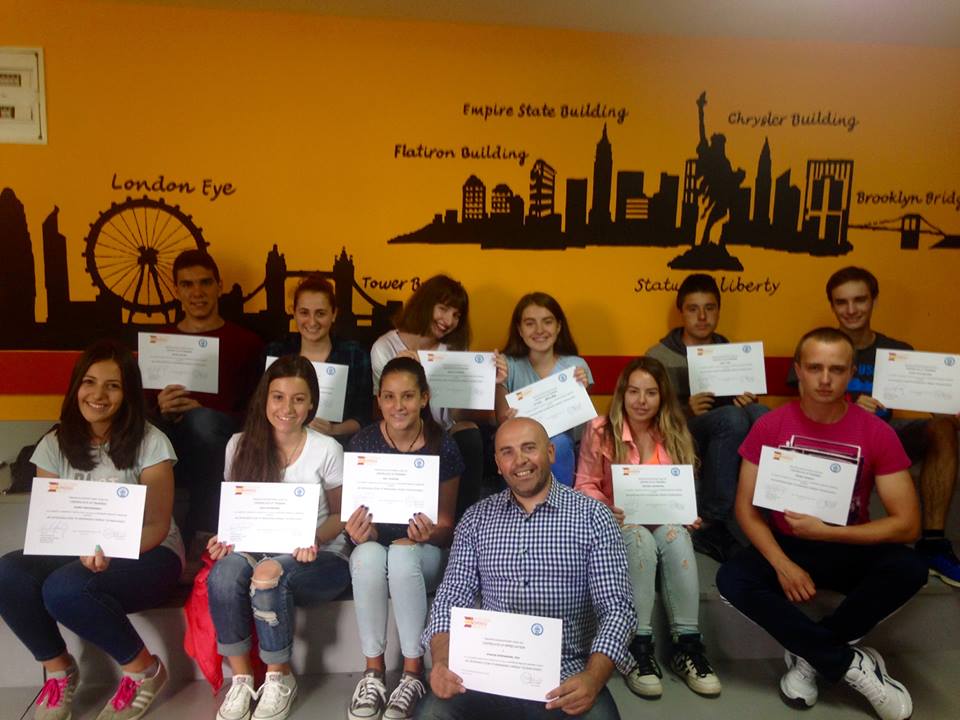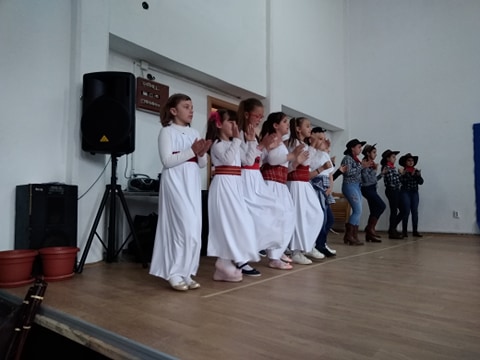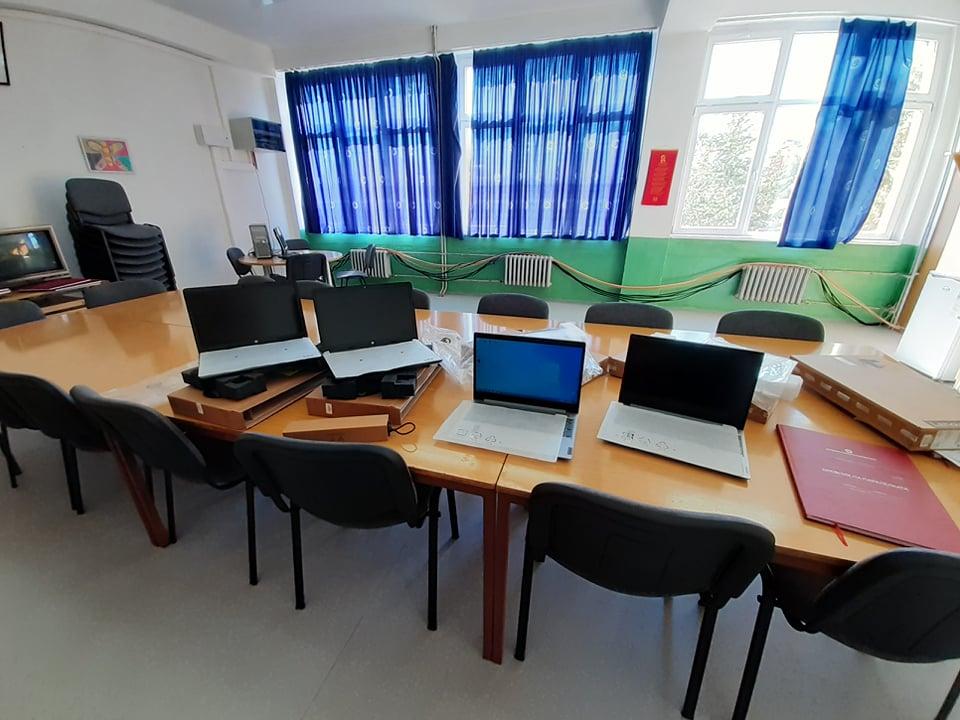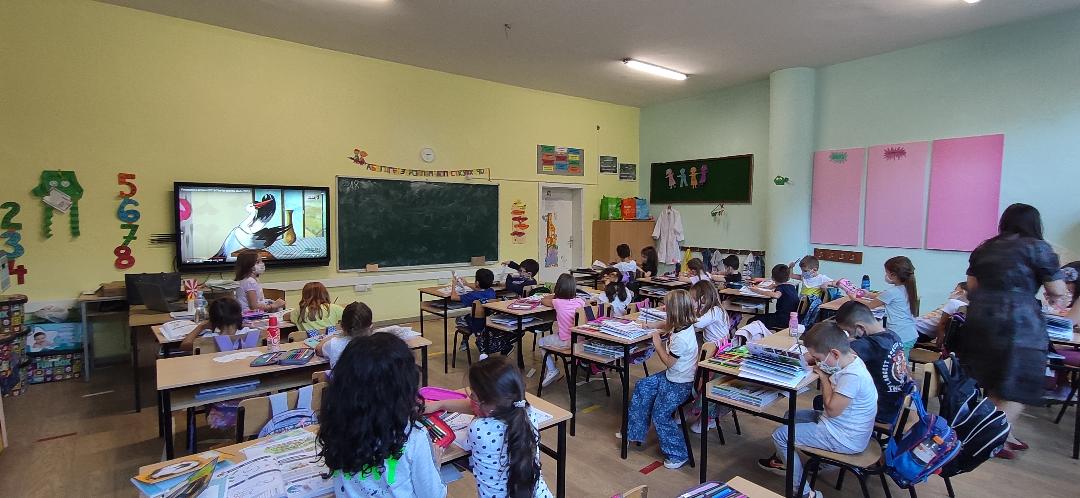Welcome to the seventh issue of the Macedonia Schools Project Newsletter. In this issue, we highlight our Volunteer Teaching Program, which began in 2013. For many summers, American volunteers worked with local teachers to teach conversational English. The Covid pandemic interrupted the Program, but it was revived in 2023, still under the direction of our founding president, Tom Lineham. We begin this issue with a description of the Program and a call for volunteers. We are happy to include two articles from our 2024 volunteer teachers. As in the past, this most recent experience proved to be heart-warming and rewarding.
Contents:
1. The Macedonian Teaching Experience for Summer, 2025.
2. Volunteer Teaching in Bitola, by Taylor Eftimov, PhD Candidate, University of Washington, Seattle
3. Summer Camp in Ohrid, by Olivia Duncan, Global Studies Major, Arizona State University
4. Donations & Membership
MACEDONIAN TEACHING EXPERIENCE: SUMMER 2025 IN BITOLA
AND OHRID, REPUBLIC OF NORTH MACEDONIA
Since 2013, the Macedonia Schools Project has recruited interested volunteers to teach conversational English classes to Macedonian students. The program’s goal is: to provide volunteers with a meaningful, quality experience in The Republic of North Macedonia while supporting aspiring students in improving their English language skills.
Qualifications: Experienced or retired teachers or college level students interested in teaching and gaining across-cultural experience. Others comfortable in school classrooms are welcome to apply.
Program fee is $400 plus housing for 2-weeks beginning mid-June, 2025. Since the MSP is a 501(c)(3) charitable organization your costs may be tax deductible.
Housing: The MSP will arrange housing unless volunteers make their own arrangements. The estimated 2-week housing costs are: $450 for Bitola and $840 for Ohrid.
Teaching environment: The MSP will recruit interested students, classrooms and a qualified Macedonian teacher/translator to work with you to ensure the highest quality experience for you and the students. The MSP coordinator will also assist you in developing appropriate lesson plans to suit the program participants, students and teachers. Volunteers may choose the students age level (including adults). All students involved will have some knowledge of English but wish to improve their language skills with native English speakers.
The Macedonian classrooms have limited resources so volunteers are encouraged to bring educational materials. In addition, volunteer teachers are encouraged to introduce other subjects such as art, science, music, biology, sports, theatre or other topics you feel comfortable with. Volunteers will be expected to teach about 1-2 hours a day, 5 days each week.
Volunteer teachers are free to experience the many cultural and historical offerings available in the Ohrid and Bitola areas during the summer.
Volunteers must sign Macedonia Schools Project volunteer program release forms before departure. Applications and fees due: April 15, 2025.
For more information contact Tom Lineham, Coordinator for the Macedonia Schools Project at: makschools@yahoo com. Or call: 360-977-2237. Visit the MSP website for photos and additional information at: https://msp.charity
Note: Volunteers cover all transportation costs to reach the Republic of North Macedonia. Financial assistance may be available.
TWO WEEKS ON ŠIROK SOKAK: VOLUNTEER TEACHING IN BITOLA WITH
THE MACEDONIA SCHOOLS PROJECT
By: Taylor B. Eftimov, PhD Candidate, Slavic Languages and Literatures, and
Graduate Teaching Assistant, University of Washington, Seattle
I arrived in Bitola on June 16, 2024, and it was hot, 80-something degrees (Fahrenheit). I decided to walk the whole of Širok Sokak (Bitola’s famous pedestrian street at the heart of the city, literally meaning wide (širok) street or alley (sokak), sokak being the Turkish version of the word). Beginning near the Clock Tower in the Central Park, I meandered along the Sokak past many small clothing shops, bakeries, Vero Jumbo, a Catholic church, restaurants, and cafes (most were closed because it was a Sunday afternoon). I passed the Cultural Center, across from the large Zlaten Dab banner (my favorite beer!) where I would be teaching for 2 weeks at the American Corner, but I didn’t realize it at the time. I made it all the way to the House of the Army and what is (I think) conceivably the end of Širok Sokak, but I didn’t stop there. I continued straight into Bitola City Park, past the museum of Atatürk, past the big arena, and along the way I played the little children’s games of hopscotch and the like written on the sidewalk. I walked past the walls of Bitola Zoo and made it all the way to the ancient ruins of Heraclea. I didn’t really know it at the time, but on that one sweaty afternoon, I had passed all the sights to see in Bitola and had seen almost all of the nooks and crannies that I’d be exploring for the next 2 weeks, even if only at a brief glance. But at the time the city still felt yet unknown to me.
I met up with the coordinator of the Bitola volunteer teaching program, Liljana Vasilevska, and she showed me to my very own apartment, just a block away from her own. My night wasn’t over yet. Liljana took me for a drink that night to talk about the program ahead, and I got my first experience of how Bitola comes alive at night. The cafes were so crowded that we could barely find a table to sit at. We talked excitedly about the 2 weeks ahead of us and watched parents with their toddlers, groups of teenagers, families across generations, and even people walking their dogs on the lit-up and lively Širok Sokak. I would come to learn from students later on that people-watching on Širok Sokak was ingrained into the culture of Bitola. This meant that the prized seat when sitting down at a café table for two, was the seat facing the Sokak, not the one facing the restaurant. I often times saw people drag both chairs to the same side of the table to face the Sokak so that both people could sit next to each other, chat, and people-watch. Maybe it is because of my American anxiety, but I never felt quite right doing that, so I usually volunteered myself to sit on the side that faced the café and people-watched out of the corner of my eye.
I was in Bitola as a volunteer teacher in a rather unique program. My “students” were adults who teach at Gjorgji Sugarev School, which meant that most of my students were actually older than I was. The set-up of the program I created took the form of a conversation table about various cultural topics each day, with a little bit of grammar and cultural lectures sprinkled in from me. But the main focus was on actually speaking and using what language the students already knew, and fostering an environment where students became more comfortable in speaking. To do this, the cultural themes such as coffee culture, travel, daily routines, literature and film, fashion, among others, really helped both me as the teacher, and other students to get to know their fellow classmates.
We learned everyone’s daily routines, which family members they cared for, what their favorite hobbies were, what their favorite movies were, and by the end of the class the students expressed to me that, “Wow, even though we work with each other every day, we learned a lot of new things about each other!” One of my shyest students even came up to me at the end of the class and personally thanked me. I thought that her speaking ability and English knowledge were fairly low, but it turned out that she just had a lot of anxiety speaking English because she perceived she wasn’t so good at it. But through the personal and welcoming space we all created in our classroom over the 2 weeks, I saw her confidence shine, but also all the other students’ confidence as well. This is the goal in all of my classrooms, whether I am teaching English as a second language, writing, literature, or culture, what I want to demonstrate to my class is that speaking a language involves both an understanding of peoples and cultures that the language is situated in, which is why we focused on different cultural themes, but also that it involves trust in the people you are learning to speak with. As a learner of Macedonian as a second language myself, I intimately understand the ways in which trust in whom I speak to is directly related to the confidence I have in speaking. When speaking to strangers, I am naturally more wary if I am speaking with correct grammar and words, but when speaking to my husband I find that I can be more fluent because I have trust that he understands and is actively working to understand my language, or attempt at it.

Class in session at the American Corner—Bitola.
We strengthened our classroom dynamics by going for an optional coffee, usually both before and after class. I always knew that coffee culture was important in the Balkans, but this experience really strengthened my understanding of Bitola’s coffee culture, specifically, in relation to professional and social connections. Going for coffee allowed for a more laid-back atmosphere for practicing language, both for my students to practice English, and also giving me an opportunity to practice my Macedonian. For those that did not have time to join us on our optional coffee excursions, we also held class in a restaurant on one class day in order to better discuss food and coffee culture differences between American and Macedonian cultures. On the last day of class, we played games, which, looking back, I regret not incorporating more of those games throughout the two weeks, even if only at the end of class for 5 minutes, because the games were a hit!

Our group holding class at a café to discuss food & coffee culture
Over the weekend between the first and second week of class, my brother-in-law, his girlfriend, and my friend from the neighborhood in Volkovo where my in-laws live, took me to different surrounding cities of Bitola. We went to Kruševo, where I got to visit the Toše Proeski Memorial House and the large, white, heart-like memorial for the Ilinden uprising of Kruševo. We went to Prilep to walk around the center and visit family. We went to Ohrid to visit Sv. Naum and relax on the beach. And we all went to the museum about Atatürk that I had passed by on my first day in Bitola. All of that was an amazing experience, don’t get me wrong. But from the first day that I arrived, I had told Liljana that my goal of staying in Bitola for 2 weeks was to live like a local, not like a tourist. So, the places that Liljana took me to felt extra special because they were not crawling with tourists. One night we hiked up the hill to a church called Forty Holy Martyrs Krkardash, which was accompanied by a beautiful view of the city below at sunset. Liljana’s mom joined us, and she brought pads to place on the picnic table benches for us to sit on and small candles and matches to light at the outside candle house. We lit candles, chatted at the picnic table, and watched children playing nearby until dark. This is one of my key memories of Bitola outside of the Sokak.
This volunteer teaching experience in Bitola meant more to me than just living and teaching in Bitola for 2 weeks, though that was an important part of the experience, of course. In the process, I was able to forge meaningful connections with coordinators both in America and in Macedonia. I enjoyed my time in getting to know coordinator and Executive Board Member Tom Lineham, President Blazo Mitasev and his wife, and of course Gjorgi Sugarev’s very own Liljana Vasilevska and her family. I forged relationships with my students, who became friends. Those relationships are at the heart of how I understand the city of Bitola and is the reason I can feel Bitola calling me back very soon.
Summer Camp in Ohrid
By Olivia Duncan, Global Studies Major, Arizona State University
This past summer, my Mother, Jill Melgard, and I had the incredible opportunity to teach summer camp in Ohrid. This was my first ever experience teaching children alongside my Mom who is a fifth-grade teacher with 20-years of experience, and currently teaching in Glendale, Arizona. It was also our first time ever coming to Macedonia, and we were eager to share our American culture with the students while also learning something new from them. For 2.5 weeks, we prepared and delivered lesson plans centered on STEAM—science, technology, engineering, art, and mathematics.
For the first week, we started off by learning each other’s names and different things we liked by passing around a beach ball to a random person in class who had to repeat what the last person’s name, and what their favorite animal or their favorite color was. This was a really fun way of bonding everyone and creating an ice breaker every morning before we started our lesson.
We designed the lessons to be interactive and engaging, incorporating hands-on activities and creative projects that allowed the students to explore the subjects in a fun and meaningful way, while also growing their English vocabulary and learning more about America.


We played lots of games, like Who Wants to be a Millionaire?, that incorporated subjects we learned in class that day such as kinetic and potential energy, geography, the scientific method, and more. Students were able to compete against each other for points using the teams they split themselves into, which made them more excited to pay attention in class! Whether we were building rollercoasters, experimenting with basic baking soda and vinegar to make rockets, or creating Ancient Egyptian art, the students were eager to come to class to have fun and learn something new.

Saying goodbye at the end oft he camp was incredibly difficult for me, especially since this was my first Macedonian class. Teaching in Ohrid was a significant milestone in my journey as an educator, and it significantly reinforced my passion for teaching and my belief in the power of education to enrich cross-cultural communication. Thanks to MSP, this was an opportunity I will always cherish, and I hope to be back soon!
DONATIONS & MEMBERSHIPS
Please become a member of the Macedonia Schools Project by making a donation to help the youth of Macedonia. Your tax-deductible contribution will enhance the growth and impact of our program. Check out our website, send us an email, or join us on social media for more information.
Website: https://msp.charity/index.php/donations
Email: This email address is being protected from spambots. You need JavaScript enabled to view it.
LinkedIn: https://www.linkedin.com/company/macedonia-schools-project/
Facebook: https://www.facebook.com/macedonia.schoolsproject/
